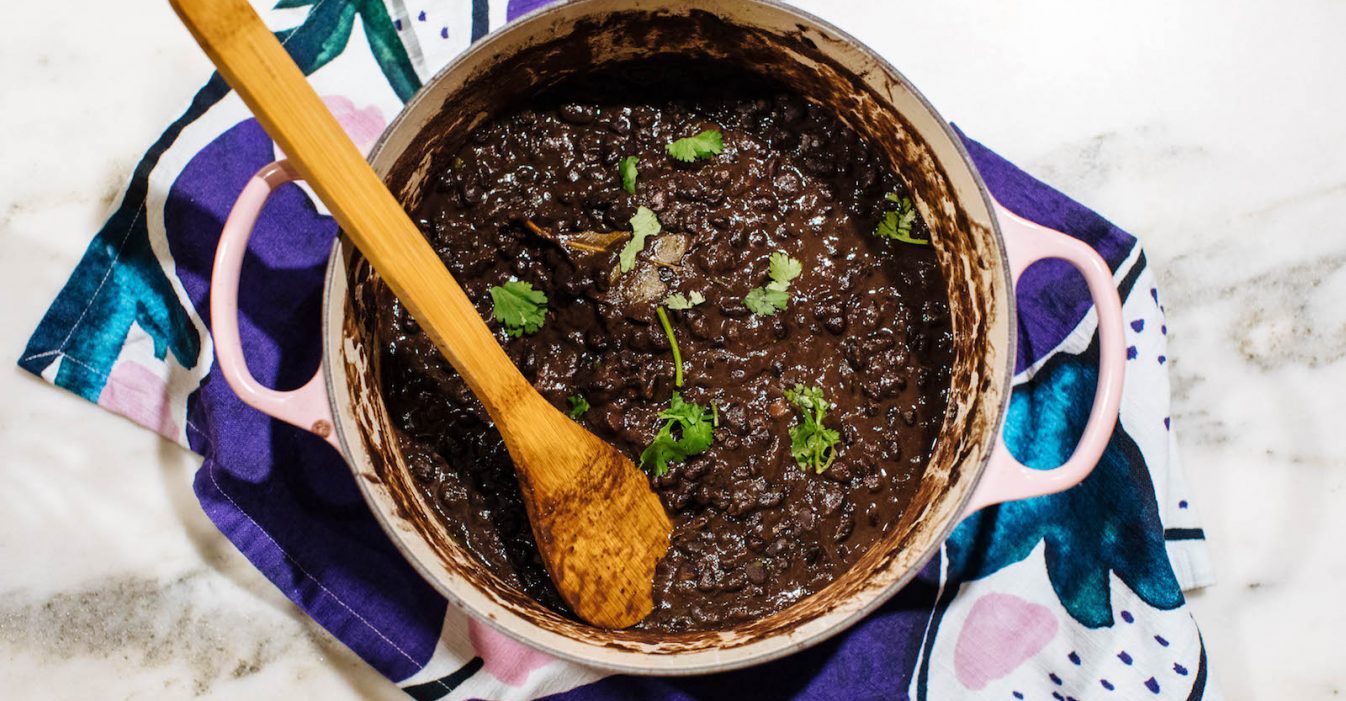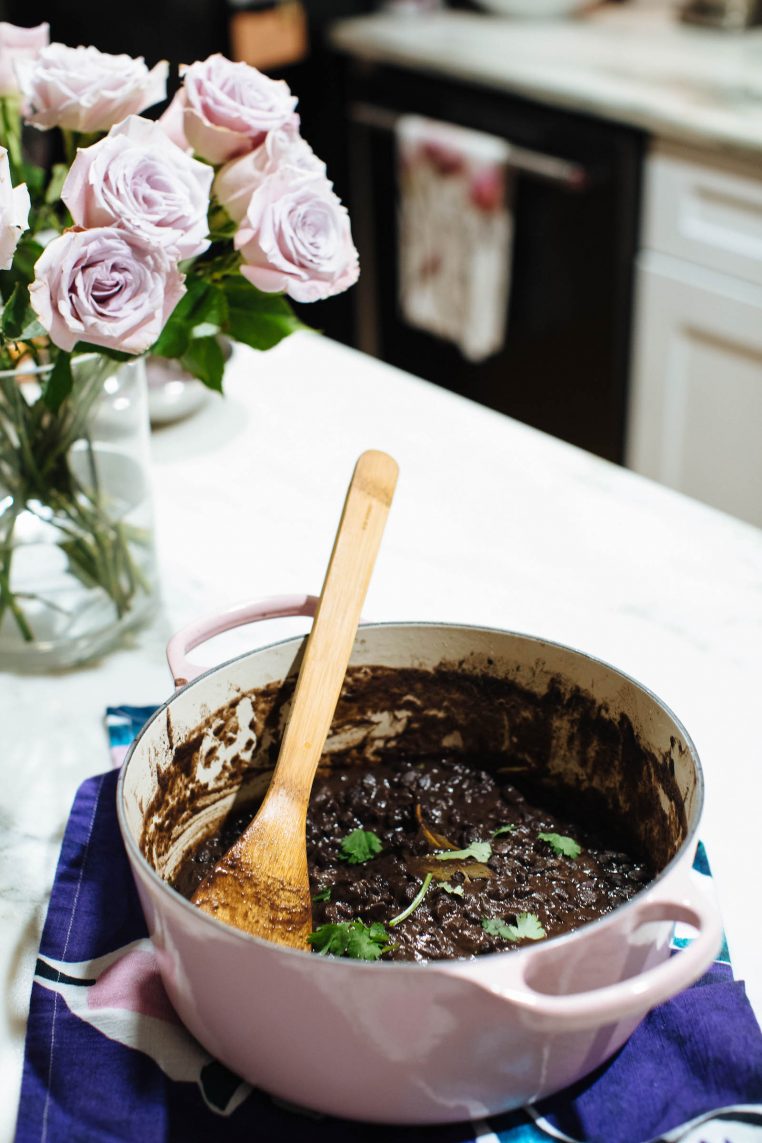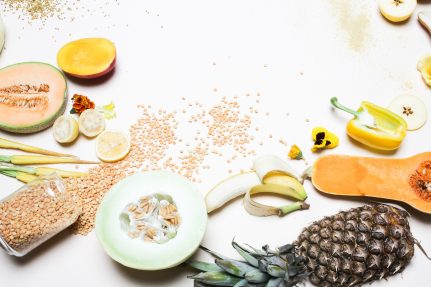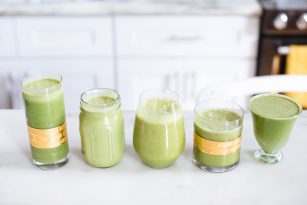Let’s talk about why a happy gut microbiome helps you feel good, every day.
Maybe you’ve heard about the “good” and “bad” bacteria in the gut — but do you know why they matter, and what role they play in your overall health? What role do they play in preventing disease? I’m talking all about the gut microbiome today, and why you need to nurture it in order to feel your best.
Click here to get your FREE eBook with more tips on keeping your digestion healthy and happy
What Is The Gut Microbiome?
The term “gut microbiome” refers to the bacteria, archaea, viruses and eukaryotic microbes residing in the body. Healthy adults typically have more than 1,000 species of bacteria in their gut. (1) This amounts to over 100 trillion microbial cells (2) and 3-5 pounds of bacteria in our digestive system. (3) Long story short, there are a LOT of these guys — these bacteria cells outnumber human cells 10-to-1. (2)
Bacteria begin to “colonize” or grow in the gastrointestinal tract at birth, and they remain there throughout the rest of your life. (4)
Our bodies have cultivated a mutually beneficial relationship with this bacteria — when they’re happy, you’re healthy. No surprise here — your diet greatly affects your gut flora — and you’ll want to nurture this bacteria in the gut if you want to feel good.
What Science Tells Us
These microbes help direct the traffic flow along the connection between our gut and our brain. This direct connection, known as “the gut-brain connection”, makes up two thin layers of more than 100 million nerve cells that line your gastrointestinal tract. The cells run all the way from your esophagus to your rectum via the vagus nerve. Emerging research continues to show us how the gut directly influences human physiology, metabolism, and immune function.
Physiology
Research has shown how microbiota influence behavior and the central nervous system, which affects brain function. It’s also shown us how the microbiota can influence energy balance. (4)
Nutrient Uptake and Metabolism
The microbiome produces vitamins, synthesizes amino acids, and can carry out the biotransformation of bile. (5)
The microbiome also makes the metabolism of nondigestible carbohydrates happen. Any resistant starches, pectins, gums, and large polysaccharides, as well as unabsorbed sugars and alcohols, are metabolized thanks to the bacteria. (5) When this happens, the body recovers energy and nutrients to feed the bacteria. (6)
After digesting fiber, some bacteria can also produce short-chain fatty acids, a critical type of healthy fat for good gut health.
Immune Function
The gut microbiome “trains” your immune system by communicating with immune cells about how to respond to infection.
Why You Need to Nurture Your Gut
All of these millions of microbes in your gut microbiome play a huge role in basic functions that directly affect our overall health. As I shared above, they contribute to our metabolism, they control inflammation (8), they help harvest nutrients from food, (9) they produce vitamins, (10) and they protect our bodies against viruses, bacteria, and infections by “training” our immune system, (11) and more. These functions have both a direct and indirect effect on our physiological systems (1) — aka, how we feel, every day.
A happy and healthy gut microbiome controls your gut health. It works with the intestines, it digests food, and it keeps the “bad” bacteria from sticking to the walls of your intestine.
Abnormalities in the gut microbiome have been associated with inflammatory bowel disease, colon cancer, antibiotic-associated colitis, and obesity. (6)
When the gut bacteria are deprived of the fermentable fibers that they feed on, they switch their food source to the mucous lining of your gut. Sound important? That’s because it is — the mucus lining keeps the gut wall intact and protected from infection. When this lining wears down, a host of health problems can happen, including obesity, depression and Type 2 diabetes. (12)
Emerging research continues to shed light on the gut microbiome and its role in overall health and in disease. This research is incredibly important for us to better understand how to feel better every single day, as well as to better understand how diseases develop and find ways to prevent them.
5 Ways to Nurture Your Gut Microbiome
Our diet is one of the most effective tools we can use to change the microbiota in our gut. These “good” bacteria eat fermentable fiber, which can be found in foods like wheat, asparagus, broccoli, cabbage, lentils, beans, onions, and garlic. Fermentable fibers make their way down to the gut microbiota in the digestive tract because they don’t get digested by human-made enzymes. (7)
- Prioritize plant-based and whole foods — these fiber-rich foods are important to feed the gut bacteria and keep your digestion regular.
- Limit the use of antibiotics — these can kill off the infection, but they also kill the “good” bacteria while they’re at it.
- Explore prebiotic foods — they’re rich in the type of fiber that the bacteria in your gut feeds on. Examples include garlic, onion, dandelion greens and artichoke.
- Pile on the fermented foods — they’re naturally rich in healthy bacteria and are usually found in fermented food. Examples include kimchi, sauerkraut, kefir, yogurt, etc.
- Avoid refined sugar — this sugar feeds the “bad” bacteria that can lead to obesity and other health problems, starting in the gut.
Should you supplement? There are so many probiotics and supplements to choose from when it comes to digestive health! We enjoy Seed and recommend these to most of our clients in NS Wellness who need extra digestion support. Check with your NS Wellness Coach or RD to see what probiotic is the best for you.
References:
- Shreiner, A. B., Kao, J. Y., & Young, V. B. (2015, January). The gut microbiome in health and in disease.
- Guinane, C. M., & Cotter, P. D. (2013, July). Role of the gut microbiota in health and chronic gastrointestinal disease: understanding a hidden metabolic organ.
- NIH Human Microbiome Project | NIH
- Neufeld, K., & Foster, J. A. (2009, May). Effects of gut microbiota on the brain: implications for psychiatry.
Vyas U, Ranganathan N. Probiotics, prebiotics, and synbiotics: gut and beyond. Gastroenterol Res Pract. 2012;2012:872716.
- Cummings JH, Pomare EW, Branch WJ, Naylor CP, Macfarlane GT. Short chain fatty acids in the human large intestine, portal, hepatic and venous blood. Gut. 1987;28(10):1221–1227.
- Koropatkin NM, Cameron EA, Martens EC. How glycan metabolism shapes the human gut microbiota. Nat Rev Microbiol. 2012;10(5):323–335.
- Holscher, H. D. (2017). Dietary fiber and prebiotics and the gastrointestinal microbiota.
- Proal, A. D., Albert, P. J., & Marshall, T. G. (2014, May). Inflammatory disease and the human microbiome.
- Kau, A. L., Ahern, P. P., Griffin, N. W., Goodman, A. L., & Gordon, J. I. (2011, June 15). Human nutrition, the gut microbiome, and the immune system: envisioning the future.
- Fujimura, K. E., Slusher, N. A., Cabana, M. D., & Lynch, S. V. (2010, April). Role of the gut microbiota in defining human health.
- Nikoopour, E., & Singh, B. (n.d.). Reciprocity in the microbiome and immune system interactions and its implications in disease and health.
- Hansson, G. C. (2012, February). Role of mucus layers in gut infection and inflammation.
Additional Reading:
- Is your gut microbiome the key to health and happiness? The Guardian
- Fiber Is Good For You. Now Scientists May Know Why, New York Times
- Gut Bacteria May Play a Role In Weight Loss, New York Times
Let’s Hear It
I’ll admit — I’m fascinated by gut health and I geek out over all of the emerging research about it! Do you enjoy learning about this important nutrition topic, too? Share this resource with others! If you have any questions or thoughts on this post — and about the gut microbiome in general — leave a comment and continue the conversation with the entire NS Community. As always, you can also connect with us on Instagram @nutritionstripped and #nutritionstripped.
xx McKel











